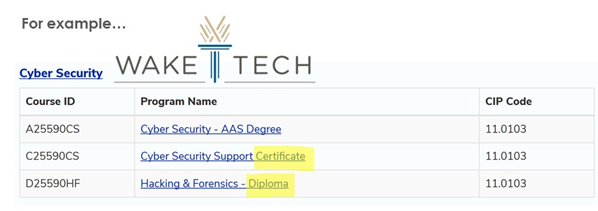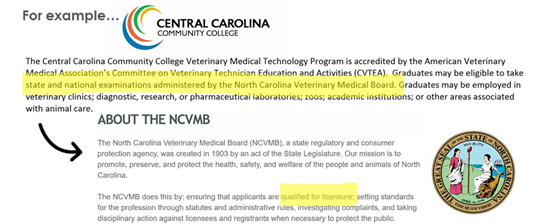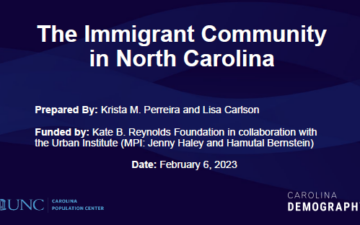What is “postsecondary attainment”?

What is “postsecondary attainment”?
This post was co-authored with the John M. Belk Endowment.
School administrators, policy analysts, and government officials have begun using the term “postsecondary attainment” when discussing successful educational outcomes. What does this mean?
Postsecondary refers to education or training beyond high school. Attainment means the completion of a postsecondary degree or nondegree credential. Postsecondary attainment is not a one-size-fits-all concept. It includes postsecondary degrees, such as associate or bachelor’s degrees, awarded by a college or university, as well as nondegree credentials. There are three main categories of nondegree credentials:
 Academic credits earned through a certificate or diploma can typically be applied towards a future degree.
Academic credits earned through a certificate or diploma can typically be applied towards a future degree.
 When we talk about postsecondary attainment, we often focus our conversations on the degrees or credentials awarded by colleges and universities. This reflects a lack of high-quality data on nondegree credential attainment outside of the collegiate environment. Because licenses and certifications are granted by third-parties—such as an independent agency or board—and not an educational institution, they are harder to track than the degrees and nondegree credentials awarded by educational institutions.Additionally, while educational institutions provide data on nondegree certificates and diplomas, these details are not yet regularly reported in large-scale population surveys, such as the American Community Survey. In most existing surveys, nondegree credential holders without a postsecondary degree are categorized as having attained “some college, no degree.” This category includes credential holders as well as students who left college without completing a course of study. National data on the share of U.S. adults with a postsecondary nondegree credential first became available in 2014; this type of data is not yet regularly available for states or counties.Next up: in-migration and its role in North Carolina’s current attainment rate.Subscribe to our mailing list to stay up-to-date with our NC education pipeline research.
When we talk about postsecondary attainment, we often focus our conversations on the degrees or credentials awarded by colleges and universities. This reflects a lack of high-quality data on nondegree credential attainment outside of the collegiate environment. Because licenses and certifications are granted by third-parties—such as an independent agency or board—and not an educational institution, they are harder to track than the degrees and nondegree credentials awarded by educational institutions.Additionally, while educational institutions provide data on nondegree certificates and diplomas, these details are not yet regularly reported in large-scale population surveys, such as the American Community Survey. In most existing surveys, nondegree credential holders without a postsecondary degree are categorized as having attained “some college, no degree.” This category includes credential holders as well as students who left college without completing a course of study. National data on the share of U.S. adults with a postsecondary nondegree credential first became available in 2014; this type of data is not yet regularly available for states or counties.Next up: in-migration and its role in North Carolina’s current attainment rate.Subscribe to our mailing list to stay up-to-date with our NC education pipeline research.Need help understanding population change and its impacts on your community or business? Carolina Demography offers demographic research tailored to your needs.
Contact us today for a free initial consultation.
Contact UsCategories: Education
Tags: NC education pipeline, nondegree credentials, postsecondary attainment, postsecondary degrees

The Center for Women’s Health Research (CWHR) at the University of North Carolina School of Medicine released the 12th edition of our North Carolina Women’s Health Report Card on May 9, 2022. This document is a progress report on the…

Dr. Krista Perreira is a health economist who studies disparities in health, education, and economic well-being. In collaboration with the Urban Institute, she recently co-led a study funded by the Kate B. Reynolds Foundation to study barriers to access to…

Our material helped the NC Local News Lab Fund better understand and then prioritize their funding to better serve existing and future grant recipients in North Carolina. The North Carolina Local News Lab Fund was established in 2017 to strengthen…
Your support is critical to our mission of measuring, understanding, and predicting population change and its impact. Donate to Carolina Demography today.